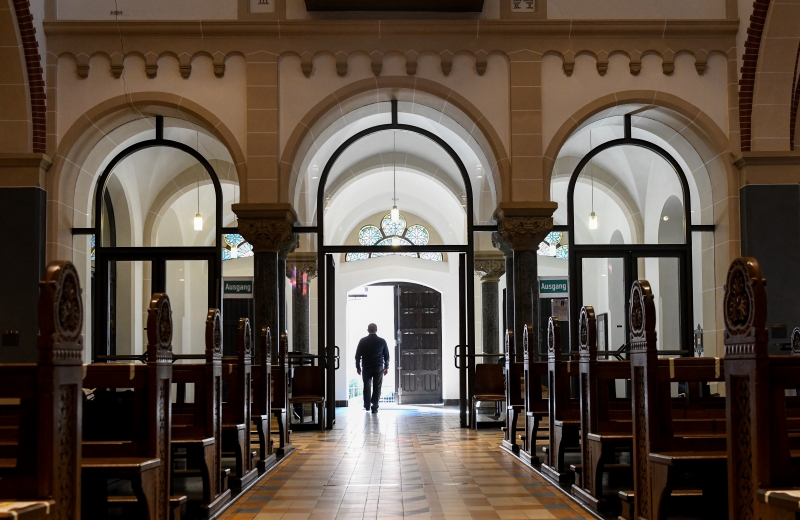29 July 2020, The Tablet
Fury in German Church over Vatican parishes document
Cardinal Woelki was almost alone in defending the Vatican document, which other bishops have attacked for "clericalism".

A man leaves an empty church in Bonn, Germany, June 12, 2020
CNS photo/Harald Oppitz, KNA
CNS photo/Harald Oppitz, KNA
The
Vatican document on the future of the parish released last week by the
Congregation for the Clergy has ignited a furore in the German Church.
While the Bishops’ Conference itself has remained silent, many bishops
have reacted with anger and contempt, with only Cardinal Rainer Maria
Woelki of Cologne defending it and Cardinal Walter Kasper steering a
middle way.
While the earlier part of the document,“The
pastoral conversion of the parish community in the service of the
evangelising mission of the Church” published on 23 July, emphasised the
joint responsibility of the whole People of God and of the parish
community for missionary pastoral work, the later part underlined that
the parish priest had responsibility for the whole parish.
Cardinal Reinhard Marx of Munich, former
president of the bishops’ conference, was one of the Instruction’s most
outspoken critics. “That is not a fruitful way forward”, he pointed out.
“You cannot have one authority announcing something, which all the
others have to obey. We must listen to one another, learn together and
take up the experiences of the local Church – all of which I miss in the
Vatican document.”
“It’s as if we in Germany had never thought
about a missionary Church! It is somewhat strange to get a document
from Rome without Rome ever talking to us about it beforehand. Is that
what is meant by cooperation between the World Church and the local
Church? Actually no, it is not!” Marx commented in the Liebfrauendom(Munich
Cathedral) on 25 July, adding that “a synodal Church is something quite
different to what we have just experienced [in the Vatican
instruction].” Cardinal Woelki was almost a lone voice in defending the
document. “It reminds us of the basic values of our faith, which,
especially in Germany, we sometimes lose sight of when we are too
occupied with ourselves,” he told katholisch.de on
24 July. “Let us - as the Church - dare to be what we are: Ecclesia,
the called out, the Body of Christ, the People of God, the royal
priesthood!”
The Vatican instruction was a “return to
clericalism”, Bishop Franz-Josef Bode of Osnabrück, vice-president of
the bishops’ conference said in a public statement. The Instruction had
taken the German bishops completely by surprise and “puts such a strong
brake on the motivation and esteem of lay commitment that I am really
worried how, under such circumstances, we will find new, committed
Christians.”
It would have been better not to publish
the Vatican Instruction, Archbishop Ludwig Schick of Bamberg, said in a
public statement, as it had done the Church and its missionary mandate
“more harm than good”. The document was “unacceptable for a canon
lawyer” as it was “theologically deficient, vague and imprecise”,
Schick, who is a canon lawyer, pointed out.
The “Rottenburg model”, which was set up 50
years ago, and lays down that the diocese is to be jointly led by the
clergy and the laity, was “not up for negotiation”, Bishop Gebhard Fürst
of Rottenburg-Stuttgart, insisted in his public statement.
The Instruction had not been quite such a
surprise for his diocese as for other German dioceses, Bishop Stephan
Ackermann of Trier said, as he had recently been summoned to the Vatican
to discuss his parish clustering plans which Rome had rejected. What he
found “particularly irritating” was that while especially highlighting
the role of the parish priest, there was not a word about clerical
sexual abuse in the document.
Bishop Peter Kohlgraf of Mainz said he could not “simply accept this Vatican intervention” in his diocese.
Cardinal Walter Kasper, former President of
the Pontifical Council for the Promotion of Christian Unity and close
ally of Pope Francis, said the Instruction had come as a surprise to
him, too. He praised the early sections on the joint responsibility of
the whole People of God, said the German bishops had concentrated too
much on the passages regarding the role of the priest, insisted the
Instruction was “in no way” a return to “authoritarian neoclericalism”,
but accepted that it “would have caused less anger and corresponded
better with Pope Francis’ synodal concept” if there had been discussion
beforehand. Committed lay Catholics, especially women “without whose
service most of our parishes would have broken down” deserved an
“express word of thanks, encouragement and recognition”, he said.






No comments:
Post a Comment